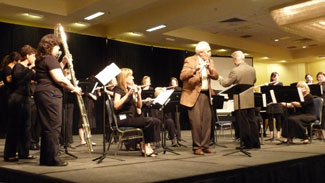At the 2012 National Flute Association Convention in Las Vegas, NV I attended a very helpful class on memorizing music. The class was presented by Molly Alicia Barth, and the following tips are taken directly from Molly's notes:
Memorizing Music
by Molly Alicia Barth
While learning the piece:
1. Get to know the piano/orchestral score as well as the flute part. Visualize the music, both while you are playing and during extended rests.
2. Listen to many recordings early on in the process, but avoid reliance on them too much for your own interpretation/memory work.
3. Get to know the melodic and harmonic structure of the piece. Are you in the main key of the piece, or have you shifted to a new key? Are the main notes of a passage the tonic of the key? Look for appoggiaturas and other fun notes to dote upon.
4. Practice with focused ears – do not let mistakes go unheeded! If you allow mistakes to creep in, the mistakes will come out when you really don’t want to see them.
5. Record yourself. You will learn a lot – listen to the recording carefully with the score for note/rhythm accuracy, intonation, rhythm, and phrasing.
6. Memorize the work using at least two methods, such as visualizing the music as it is printed on the page and memorizing the intervals from one note to the next. It is important to give yourself a “fall-back” method if the first doesn’t work.
7. Own the work: practice all details of your interpretation from the start of the process: dynamics, phrasing, articulations etc. must all be internalized along with the notes.
8. Learn in multiple environments. Recall of a piece is aided when you are not accustomed, for instance, only to playing the piece in your living room. Play in a variety of settings - concert halls, churches, studios, classrooms, practice rooms. Ideally, when in the learning stages, find spaces that do not cause distractions.
9. Study a work in segments, and then integrate small segments together.
10. If possible, practice with intent to memorize from the first reading of a piece.
Specifics in the memorization process:
1. Tonality
2. Motives
3. Phrase structure
4. Small segments
5. Imitative sections: check notes, rhythms, articulations, dynamics for variance
6. Choreography/movement: create movement cues to aid performance
7. Ornamentation
8. Tempo relationships
9. Composite between flute part and other performers’ parts
Ideal time frame for the memorization process:
1. Complete the entire memorization process one month prior to your first performance. In order to accomplish this, I ideally start memorizing three months or more prior to the first memorized performance.
2. Have small goals: a few measures each day/a page per week, and once you accomplish the daily goal, remind yourself of the previous days’ work by running through from the start of the work until the end-point of your daily goal.
3. Once you think you know it, start playing the piece as often as possible for a trial audience.
When you feel that you have a handle on the piece:
1. Look up – get out of “memory land”. Feel comfortable looking at your accompanist and/or audience.
2. Play for at least two peers and two superiors/mentors, at least two weeks prior to the first performance. Find people who will make you nervous, and who will offer constructive criticisms and well-deserved compliments. For example, I perform memorized works for my students and trusted co-workers, two weeks prior to the first public performance.
3. Learn to cope with distractions: improve the ability, through practice, to stay on track when something unexpected occurs (a loud noise, someone unexpectedly entering the room, etc.). The presence of an audience at the time of performance inherently means that distractions will be a part of the performance, so it is quite important not to overlook this detail.
4. Create a memorization chart. Write down or take special note of critical structural, interpretive and technical cues.
5. If your learning style permits, on the day before/day of a performance, both visualize the music in your head and also carefully look at the score or flute part.
Sources:
The effects of altering environmental and instrumental context on the performance of memorized music. Jennifer Mishra and Willia M Backlin
Improving Facility in Music Memorization. Edgar Ross
Part and Whole Methods in the Memorization of Music. Cyril C. O’Brien
Preparing for Memorized Cello Performance: the role of performance cues. Roger Chaffin, Tania Lisboa, Topher Logan, Kristen T. Begosh


















 I have been chosen in competition to be a member of the 2012 Professional Flute Choir, and will be performing in concert with other flutists from across the nation at this year’s National Flute Association Convention in Las Vegas, NV. If you are attending the convention, or live in Las Vegas, this is a chance to hear a one of a kind concert of challenging music. We will play at the Pompeian Ballroom in Ceasars Palace on Saturday, August 11th at 10:00am and for the closing ceremonies at the Augustus Ballroom in Ceasars Palace on Saturday, August 11th at 4:00pm.
I have been chosen in competition to be a member of the 2012 Professional Flute Choir, and will be performing in concert with other flutists from across the nation at this year’s National Flute Association Convention in Las Vegas, NV. If you are attending the convention, or live in Las Vegas, this is a chance to hear a one of a kind concert of challenging music. We will play at the Pompeian Ballroom in Ceasars Palace on Saturday, August 11th at 10:00am and for the closing ceremonies at the Augustus Ballroom in Ceasars Palace on Saturday, August 11th at 4:00pm.

